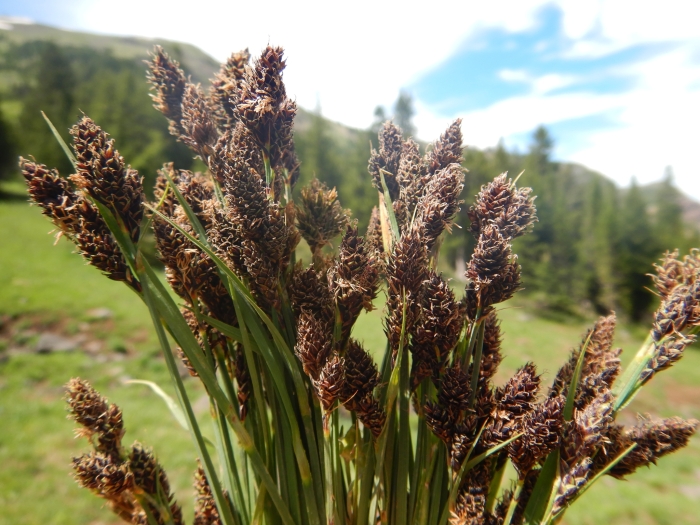Different-Nerve Sedge
(Carex heteroneura)
Different-Nerve Sedge (Carex heteroneura)
/
/

© Matt Lavin
CC BY 4.0
Image By:
© Matt Lavin
Recorded By:
Copyright:
CC BY 4.0
Copyright Notice:
Photo by: © Matt Lavin | License Type: CC BY 4.0 | License URL: http://creativecommons.org/licenses/by/4.0/ | Uploader: mattlavin | Publisher: iNaturalist |
























Estimated Native Range
Summary
Carex heteroneura, commonly known as different-nerve sedge, is a perennial herb native to the moist montane and subalpine habitats of western Canada and the western United States, particularly in the Sierra Nevada mountains. It thrives in moist environments like wet forests, meadows, and along streambanks. This sedge typically forms dense clumps and can reach up to 3 feet in height, though it is often shorter. The plant is characterized by its oblong or cylindrical spikes, which are dense with bicolored spikelets, and the perigynium is greenish or purplish with a short, rounded tip. The flowering season occurs in late spring to early summer, and while the flowers are not particularly showy, they add a subtle texture to the landscape.
Different-nerve sedge is valued for its adaptability and resilience, making it a suitable choice for restoration projects and naturalistic plantings in wetland areas. It is also used in rain gardens and as a ground cover in moist, shaded gardens. Carex heteroneura prefers moist, nutrient-rich soils and can tolerate a range of light conditions from full sun to partial shade. It is generally low-maintenance but may require additional watering during dry periods. There are no major disease or pest issues associated with this sedge, but it can become less vigorous in overly dry or nutrient-poor soils.CC BY-SA 4.0
Different-nerve sedge is valued for its adaptability and resilience, making it a suitable choice for restoration projects and naturalistic plantings in wetland areas. It is also used in rain gardens and as a ground cover in moist, shaded gardens. Carex heteroneura prefers moist, nutrient-rich soils and can tolerate a range of light conditions from full sun to partial shade. It is generally low-maintenance but may require additional watering during dry periods. There are no major disease or pest issues associated with this sedge, but it can become less vigorous in overly dry or nutrient-poor soils.CC BY-SA 4.0
Plant Description
- Plant Type: Grass
- Height: 1-3 feet
- Width: 1-3 feet
- Growth Rate: Moderate
- Flower Color: N/A
- Flowering Season: Summer
- Leaf Retention: Evergreen
Growth Requirements
- Sun: Part Shade
- Water: Medium
- Drainage: Medium
Common Uses
Border Plant, Deer Resistant, Erosion Control, Low Maintenance, Water Garden
Natural Habitat
native to the moist montane and subalpine habitats of western Canada and the western United States, particularly in the Sierra Nevada mountains
Other Names
Common Names: Clustered Field Sedge
Scientific Names: , Carex heteroneura,
GBIF Accepted Name: